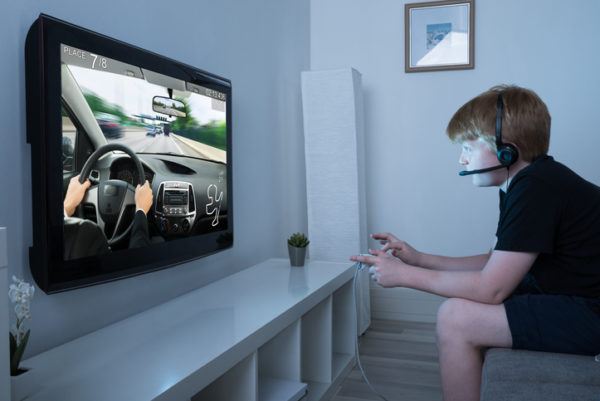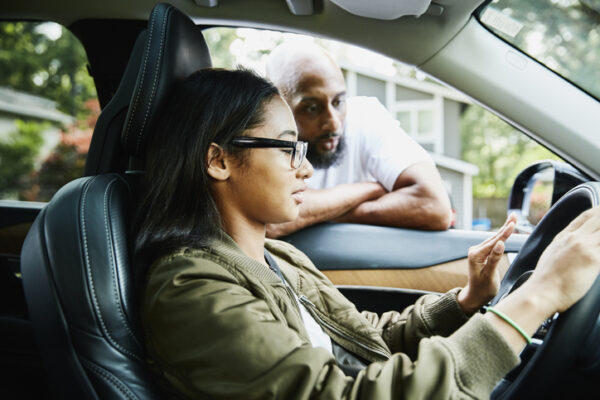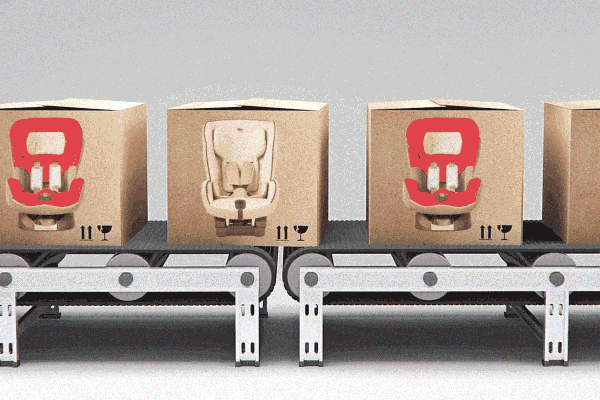If you ever thought your teenager, or teens in general, play spend too much time playing video games, you might be on to something. According to a Pew Research poll, 84 percent of teens said they have a game console at home or have access to one. Other studies have shown that 56 percent of teens play video games an average of 2.5 hours per day. And if you’re convinced that all of this video game playing, especially car driving games, has an impact on teenagers’ real-world driving skills, you’d be right about that too.
The question is what kind of impact do video games have on teenagers’ driving skills? The natural assumption is that they’d negatively impact teens—the thought being that the aggressiveness needed to succeed in these games could follow them to behind a real-life steering wheel and lead to reckless behavior like speeding, tailgating and trying to “beat” yellow lights before they turn red.
However is it possible that teens who play video games for hours—particularly driving games—could actually develop habits to lead to better driving? After all, much like driving, video games require quick reaction time and good hand-eye coordination. With that in mind, should we be so quick to ask teens to put down their controllers?
Well, it depends on whom you ask. Several studies have been conducted to examine video games’ impact on the teen drivers—with varying results. Here are a few observations about whether or not video games impact teen driving.
Different Video Games Impact Teens’ Driving In Different Ways
 Teenagers who play more mature or risk-glorifying video games could be more inclined to become reckless drivers than those who don’t play those types of games, according to the American Psychological Association. Reckless driving could lead to an increase in car accidents, police stops and more willingness to drink and drive.
Teenagers who play more mature or risk-glorifying video games could be more inclined to become reckless drivers than those who don’t play those types of games, according to the American Psychological Association. Reckless driving could lead to an increase in car accidents, police stops and more willingness to drink and drive.
Dartmouth College conducted a study that comprised 5,000 U.S. teenagers, where half of the participants reported in their initial interview that their parents let them play mature video games. The games noted were associated with increases in thrill seeking, rebelliousness and self-reported risky driving, according to the study. The number of teens who said they’d been pulled over between the second and third interviews increased from 11 percent to 21 percent. Meanwhile, the number of participants who said they were in a car accident in that timeframe went from eight percent to 14 percent.
In the third interview, the participants were 16 years old, and 25 percent of them said they engaged in unsafe driving habits. By time the teens were 18, 90 percent of them said they had at least one risky driving habit, including speeding, failing to yield, tailgating and running red lights.
Another study at Xi’an Jiaotong University’s School of Management in China backed up the idea that different types of video games can affect teen drivers differently. In this study, researchers had a group of students play a car racing video game that varied in levels of intensity. It found that participants who took part in the more intense racing game were more likely to take risks in critical traffic situations than those who played the more neutral game.
Driver’s Ed-focused Video Games Can Have A Positive Impact On Teens
 Not all video games are created equal. A lot of the games mentioned are designed to finish the fastest or rack up the most points, which isn’t what real-world driving is about. Video games’ impact on teen drivers can be a lot more positive, if and when the driving game more accurately reflects what they will experience on the road.
Not all video games are created equal. A lot of the games mentioned are designed to finish the fastest or rack up the most points, which isn’t what real-world driving is about. Video games’ impact on teen drivers can be a lot more positive, if and when the driving game more accurately reflects what they will experience on the road.
For example, Edward Downs, a researcher and communication associate professor at the University of Minnesota Duluth used a video game console to change teenagers’ attitudes about distracted driving. He created a driving simulator game that had a steering wheel, gas and brake pedal with the intention of showing teens how dangerous it can be to use a cell phone while driving. Downs’ experiment broke a group of UMD students into three groups: texting while driving, talking while driving and no distractions. Not surprisingly, the texting group was most likely to crash, while the talking while driving group were more likely to have a speed violation.
The participants’ attitudes towards distracted driving changed after they had a chance to use the simulator without distractions and compare their distracted versus non-distracted scores.
Video Games Could Affect Teen Drivers, But There’s No Certainty That They Will
Race-car video games and driving simulator games can give us an idea of how a teen driver will perform, but the only way to know for sure is for them to drive in real-world situations. Basing a teen’s driving ability solely on how they perform with a game or on the type of games they play is unfair to them and likely does not tell the whole story. Driving games, along with Driver’s Ed classroom and behind the (real) wheel training will paint the clearest picture of a teenager’s driving potential.
By Joe Dyton









D Dickinson says,
Why not develop safety oriented video car games. Maybe similar to “life” board but
With the emphasis on safe driving, losses for bad decisions.
Incorporation of increase of insurance rates for accidents, loss of playtime, downgrade vehicle the opposite for good driving. Goal to have best vehicle with lowest of insurance while accomplishing
set tasks. Give to teens whose parents are insured. Maybe offer a nominal cost to cover development costs or free. The kids will be added to insurance soon. Help them learn about consequence for poor judgement.
hulk says,
Video games are fun
Toofastnotfurious says,
I think that there is definitely potential for teen drivers to benefit from playing driving video games. Obviously there are titles out there like Need for Speeds and Forza where the objective is to go as fast as possible, and in open world games as fast as possible through traffic and avoiding police, but the behaviour in real life is where the young drivers need to learn the disconnect. Being able to drive quickly between traffic is not something that is safe to do in real life but can be done in video games for points in most driving games, which seems to glorify it but hopefully through education and understanding of the dangers of moving tonne or multiple tonne vehicles at high speeds is not something you want to go messing around with. From personal experience I feel like I might be more alert from driving in simulators and playing racing video games, obviously these both have risk-free consequences. Developing skills like my reaction time, spatial awareness, quick decision making has all contributed to me being a fairly safe driver I would like to think. This has definitely helped me to maintain a good knowledge of road rules and understand who was right of way etc. in a split second which would be very useful for learner/young drivers.
Liam says,
Okay okay, i have played Forza Horizon 4 for around 2 years, the objective is not too go as fast as possible, i have collected 198 cars in the game, and the goal of the game is not to go as fast as possible because most or the cars in the game are SLOW cars, i have at least 4 cars in my garage that can’t even reach 50MPH, the goal of the game is to have more FUN and less TRYING TO BE THE FASTEST, but you are a bit correct about the Need For Speed games, mainly the newer ones, i have played Need For Speed: Hot Pursuit 2 (2001) ever since it came out, the goal of the game is to try to get away from the cops, but also win the race so you have to multitask, but in newer NFS games the main priority is to go the fastest as possible and that should’nt be the goal of a car game
x says,
yes
yo mama says,
I think this is false
Pep Edger says,
If someone is playing 8 or more hours of video games, they probably aren’t getting too much sleep (or have other problems) that I feel would be more likely to lead to unsafe driving. Also, “participants were more aggressive when they drove a simulator right after finishing a virtual race,” is kind of bogus. Maybe it was a typo. Was the study really to see if people would drive more aggressively on a computer after just finishing racing on a computer? Why wouldn’t they? Nothing to lose, no one to hurt after all. just some fun to be had flooring it. The article acts like these studies are facts, when in fact, the studies themselves haven’t even jumped to a conclusion like the author has. Be sure to keep an open mind and think for yourself when reading people.
A Culture Mind says,
There are collisions, not accidents. And human nature is to blame, hence the need to alter it.
Glenn says,
I’m in mid 50’s and I am sure that playing video games positively contributed to improving reflexes. When I steer quickly to avoid a mistake by another driver I often say “Thanks to ‘Asteroids’ I’ve been saved again today.
Motorcycle riding, bicycle riding, playing team sports….and sleep…all contributed to better reaction times while driving a car…..probably more than video games.
I encouraged my kids to play video games when they were young…but they were more interested in studying. Sad….wasted youth spent on studying instead of honing their driving skills.
Joe Braun says,
Very Interesting Article.
It might be worthwhile to have a video that encouraged good driving in realistic situations which can get to be pretty scary, e.g. when large trucks at high speeds are present in bad weather!
Doesn’t need to be a game, just maybe something on U-tube.
JCB
David says,
Wow just another way to blame someone’s actions other than the person who did the act.
What ever happened to personal responsibility. Don’t blame the Game the Car or the Gun.
Most kids know right from wrong at about age two. If you have to blame something blame the gene’s the kids have irresponsible parents and they most not have a life if there playing eight hours a day.
Get a JOB.
Darren says,
The teen articles were very informative as well as educational, thanks a million GEICO
John says,
The story within the story: apparently some parents allow their kids to play over 8 hours of video games a day. Those parents should probably be cited for child neglect!
ManoaHi says,
Correlation is not causation. Diet, other activities like sports, peer types, environment (family life as well as environmental climate), who’s riding, phone usage while driving, alcohol or drug usage, etc. Too many factors in causing accidents, but centered only on gaming (or screen time)?
“Those who often played the games were more likely to admit to unsafe driving habits like speeding, tailgating or not wearing seatbelts (all leading causes of teenage driver accidents).”
Interesting, “not wearing seat belts” is one of the “leading causes of teenage driver accidents”? I’ve never heard of lack of seat belts causing accidents. Like why did he crash? He wasn’t wearing a seat belt. Huh? More like preventing death or injury, where the question isn’t cause of crash but cause of death. Why did he die? He wasn’t wearing a seat belt.
But back to “Those who often played the games were more likely to admit to unsafe driving habits ” More likely to admit. So, as a comparison (since “more” is used) would be that those who don’t often played games are less likely to “admit” to unsafe driving habits. I remember being a teenager (those computer/console games didn’t exist yet), and yeah we drove rather unsafely when parents weren’t in the car. So, gamers are more likely to tell the truth (admit), while non gamers more likely to lie (not admitting). I’ll accept correlation but I can’t make the jump to causation.
Darren says,
Your reasons are valid points also.